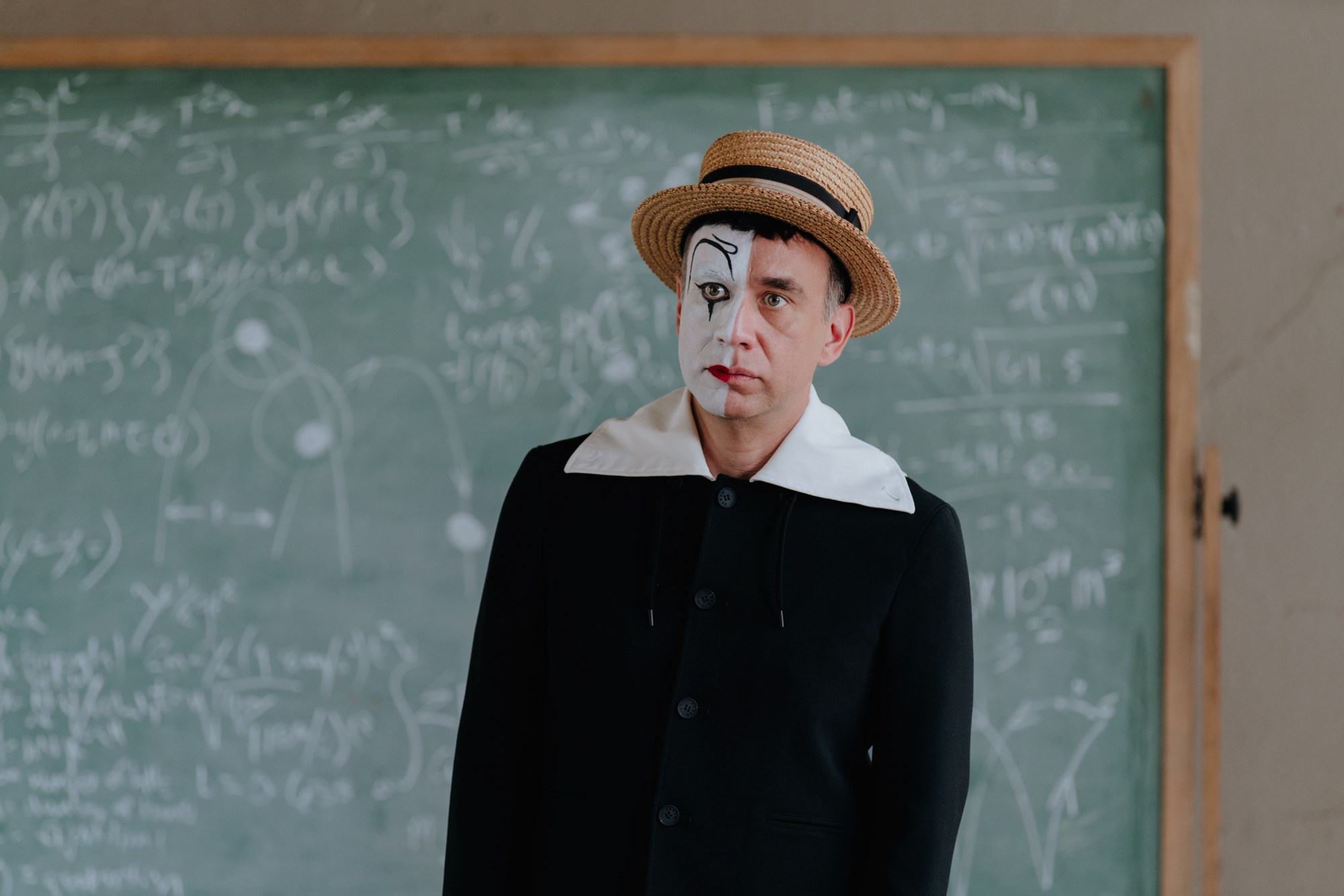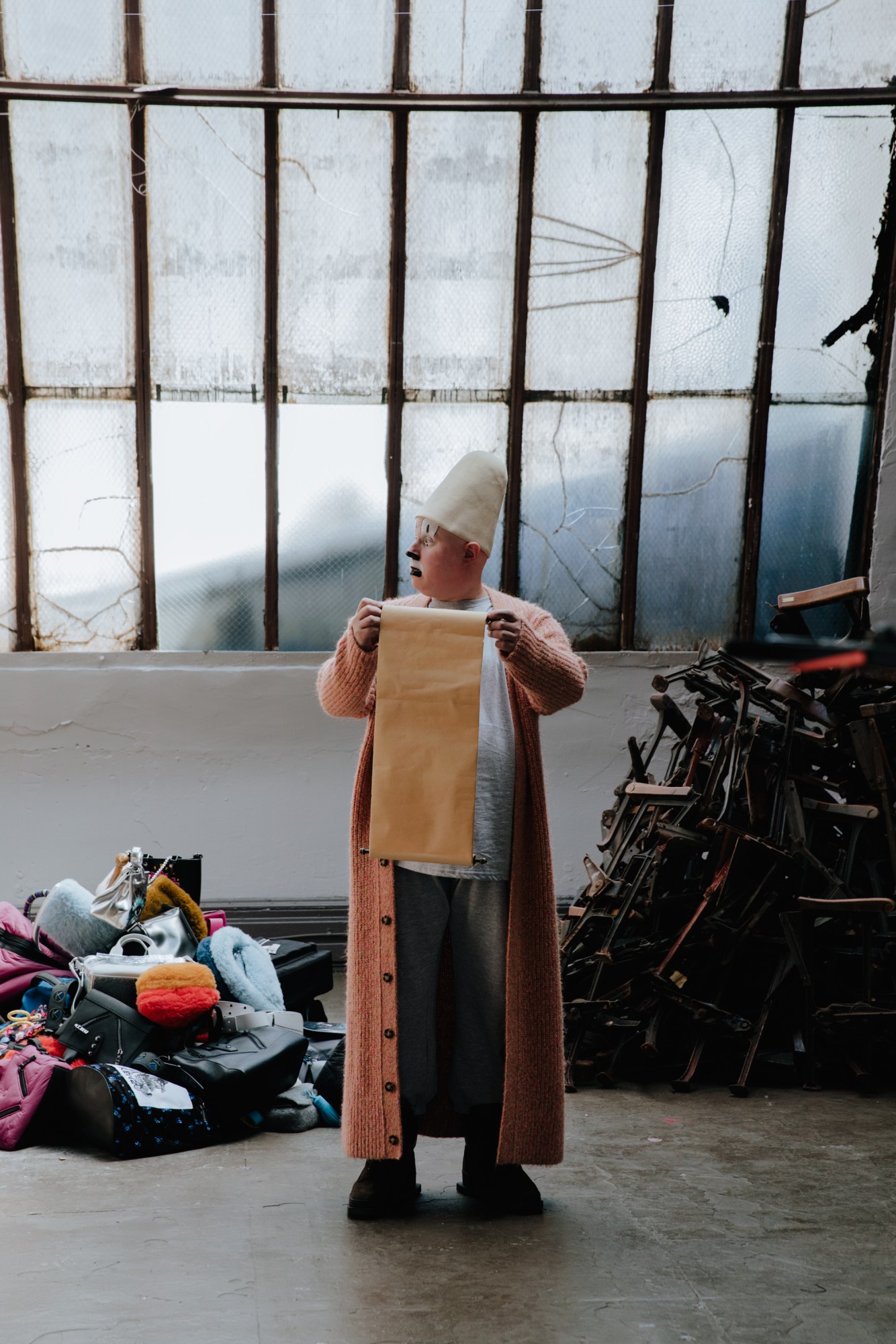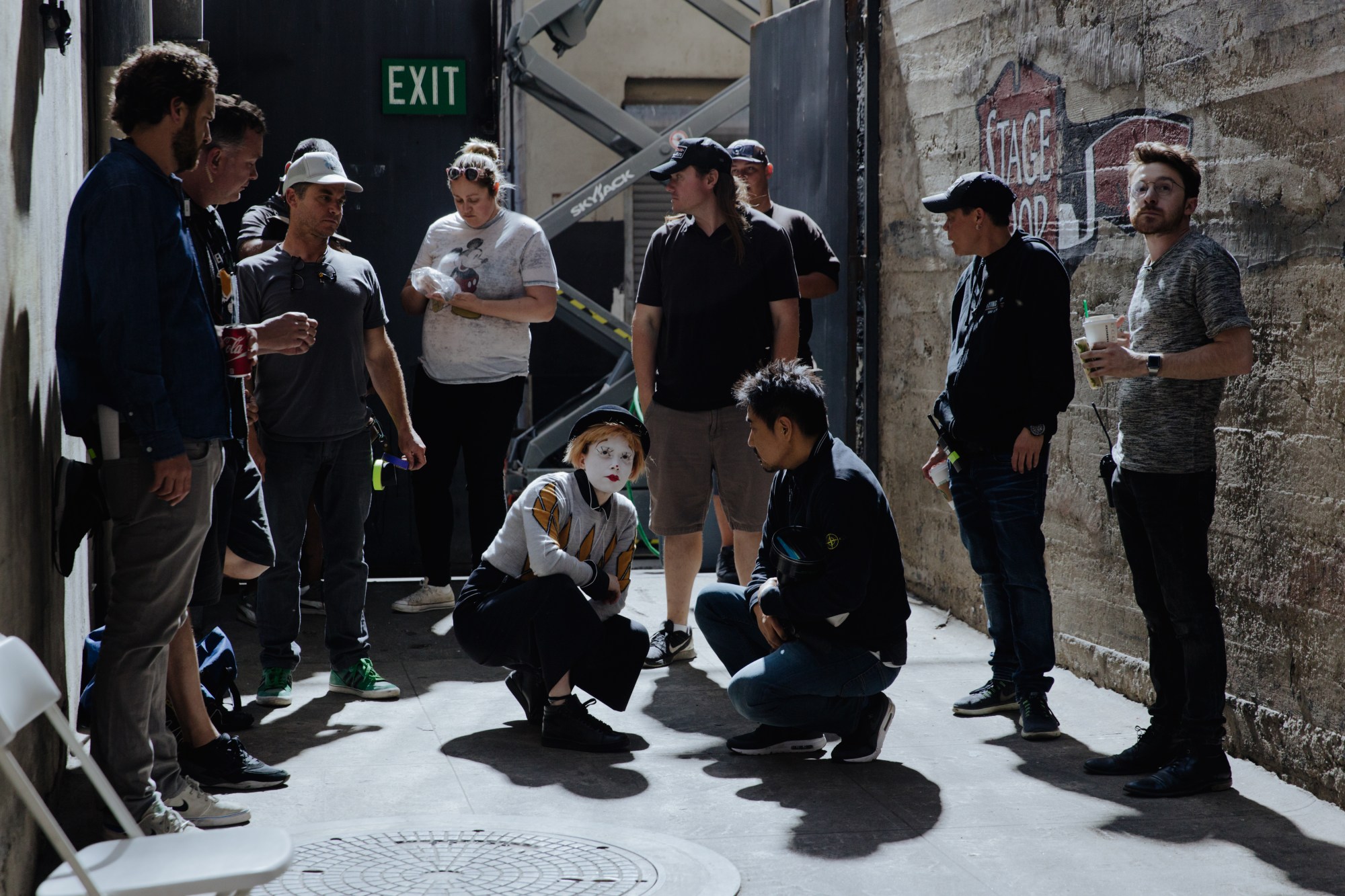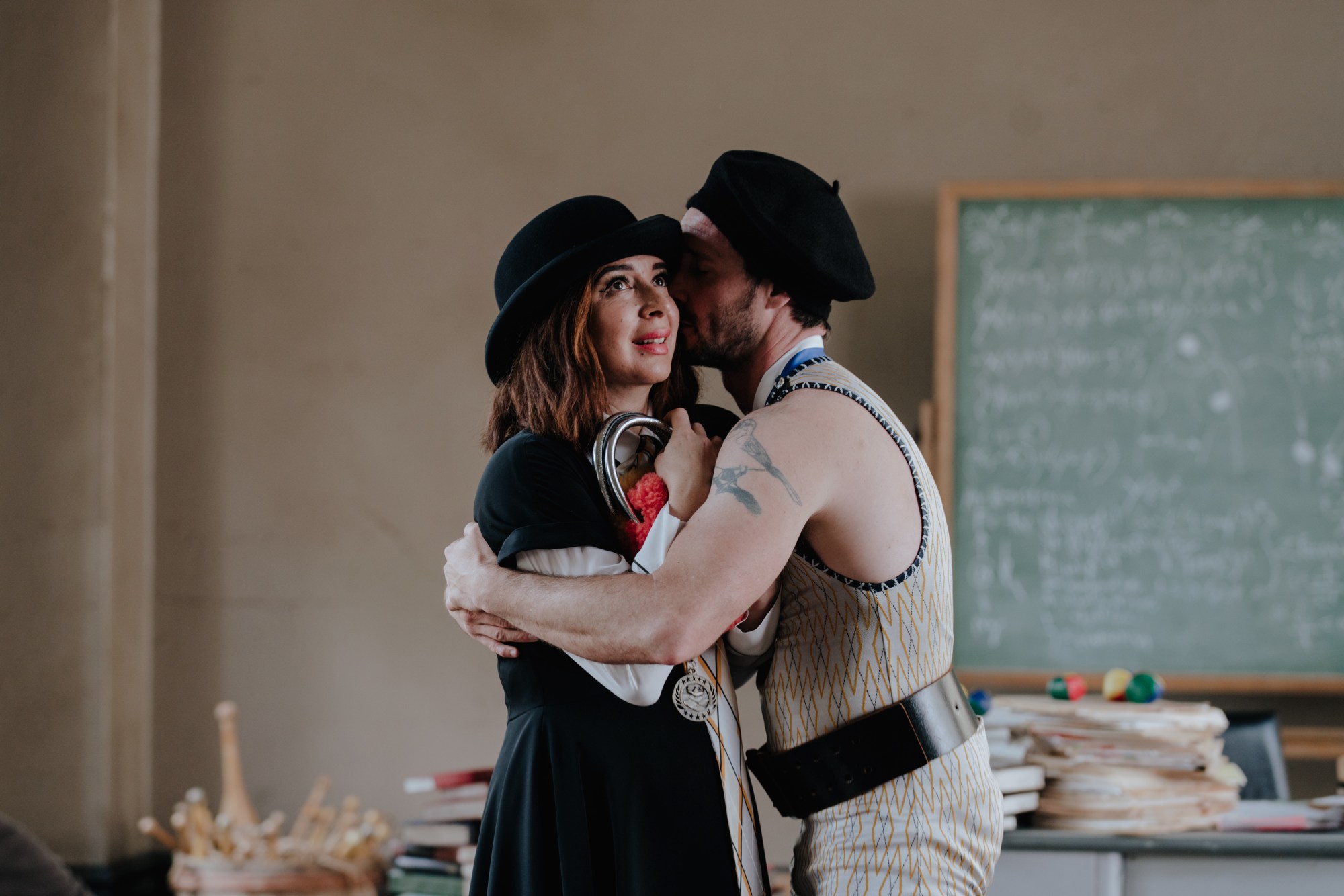With Matt Lucas as a playful panhandler, Fred Armisen as a mischievous mime and Greta Lee as a sultry showgirl, Kenzo‘s Casper Sejersen-shot autumn/winter 17 campaign imagery teased the surreal absurdity of the French fashion house’s fifth film, but its message of self-discovery and self-acceptance is a welcome surprise.
After working with Gregg Araki, Sean Baker, Carrie Brownstein and Kahlil Joseph, Kenzo’s creative directors Humberto Leon and Carol Lim asked Natasha Lyonne to write and direct their latest short. Her answer was to work with her closest friends — including Maya Rudolph, James Ransone, Macaulay Culkin, Waris Ahluwalia, Leslie Odom Jr. — and to present a wonderfully warped take on her own life — from pushed child star to troubled twenty-something to rediscovered talent. Beyond the oddity and exaggerations, Cabiria, Charity, Chastity offers a hopeful take that we can all make sense of our place in the world.
Over the course of twelve minutes, we follow Chastity (played superbly by Maya Rudolph), as a modern-day Giulietta Masina (La Strada, Federico Fellini, 1954) and Shirley MacLaine ( Sweet Charity, Bob Fosse, 1969) as she learns to reconcile with her Vaudevillian past in order to step into her life more fully. While Chastity finds her own, uncompromising way of coexisting with the knowingness that reality itself is a kind of absurdity. In amongst Kenzo’s autumn/winter 17 collection, the message is of the power of regaining control of our own narratives.
What was the catalyst for this film? You’re a long-time friend of Kenzo creative directors Humberto Leon and Carol Lim so did it develop out of a conversation with them, was it something you pushed for, or something that evolved organically entirely?
This time last year, I was part of the Opening Ceremony spring/summer 17 show. I can still remember being on a stage, talking about the New York City subway system and my concerns about the L-Train, which is something I think about often, ha. Anyway, during the fitting, they asked me when I was going to create a video for them.
This is the 5th film Kenzo has produced with a different writer/director. Previously the house has worked with Gregg Araki, Sean Baker, Carrie Brownstein and Kahlil Joseph, garnering two Tribeca Film Festival Tribeca X Award nominations. How conscious were you of what came before? What pressure did you put yourself under?
It’s not like designing a short in film school on a Super8. Of course, I was intimidated. Carrie, who I adore and is my friend, is the smartest person I know and she had so much more experience as a writer and creator than I did going into this. Spike is constantly in their orbit, Kahlil, Sean and Greg are all serious filmmakers that I respect. There was an element of this being a nightmare scenario — the first thing you ever make being such a big thing, it’s forever, until the world falls apart.
Well, given what’s happening in the world right now that might be sooner than we might’ve once thought.
True. With the stakes of the world being so high, it’s helpful in some ways because it puts everything into perspective, the degree to which something is perfect or not is almost inconsequential. It frees a person up. It has allowed me to open up my head and let people in. If these were safer times, I might have been a more buttoned-up expedition. When we were shooting and simultaneously we were wondering about North Korea and the prospect of war and that went on through editing and it’s still happening. It’s crazy how we can seemingly exist on 11 on the anxiety scale.

How much did the political happenings around you, push you to be more surreal, to be more absurd?
A great deal. In general, we’re living through a time in which you can’t be a functioning human being without being acutely aware that something is very wrong. So, that kind of underlying anxiety has to inform every aspect of everyone’s lives, in all fields. It feels like a risk-everything, because it might be over anyway, in a Dr. Strangelove moment.
Where were you when you started writing and what was happening in the world?
I was in the UK filming a movie. I actually wrote most of it on location in Cardiff. Coincidentally, the Women’s March was happening in London when I was in town and I went along. Of course, the film’s main influences were Fellini but there’s no escaping the mood of the world, wanting to articulate this idea of eloquence in the incoherent and the idea that the emotional apocalypse that we’re all waiting is already happening, just in slow motion. There’s that great John Maus song at the end of the film in which Chastity sings and there’s this idea that we might be living in this dead zone, but there’s hope. Not to mention the underlying post-traumatic stress of childhood, each in our own way, existing in the world and being aware of injustice. For me, when I was a troublemaker and a junkie, I was wrestling with this theme of injustice. Teenage me spent a lot of time not being able to process how the world was wired. In my own strange way, those are themes that I’m reluctant or unable to speak about as clearly. I honestly enjoy jokes and humour so much, I almost have a spiritual belief in them, like laughter is one of the few things that’s real in this world but this is my heart and soul, it’s how I see the world.

You’ve invested so much of yourself into this short. How do you feel watching the finished film?
Honestly, it makes me cry. It reminds me of my family putting me in showbiz as a child and trying to deal with the fear and reality of that. What it’s like being an outsider and why being different is some sort of crime but at the same time, is something we prize so much, too. In my personal life and career this is something I’ve both suffered for and been praised for. Ultimately, it’s about that swinging charade that is outside judgement in general.
Did you find the process of writing and directing quite therapeutic and cathartic?
Firstly, it came out pretty quickly. I now understand what people mean when they say, ‘you either see the thing or you don’t’ but there have been other times when I’ve been lost. For some reason, I could see it, it clicked and the first draft came to life in a night. My friend Katherine Waterston was in London at the same time and she was the first person to read it. We were soon laughing, picturing how strange it was going to be and that was hugely encouraging. So I kept on it and it just kept growing. The fact that Chung-hoon Chung, one of the world’s greatest cinematographers, actually shot it blew my mind. He’s incredible. The same happened when Arianne Phillips came on board. The idea that I could work with people, that I just couldn’t as an actor, was truly special and hugely exciting.
Not only does the film open your head, it opens up your world too. From Maya Rudolph to Fred Armisen, the cast is filled with people that you have long loved, lived and worked alongside. Was there a casting process?
For the most part, the casting process was text messages because they’re people in my life, whether that’s because I’m sleeping with them or otherwise. They’re all friends or friends of friends. The whole thing is homegrown which made it an even more meaningful experience.

Could you talk us through the work dynamic. What was it like on set?
As I know them so well, we have a shared trip. We’re very serious about what we do and because we have personal relationships, they knew just how much it meant to me. It was very emotional for Maya and myself to make something so special together. My heart couldn’t take it at times — some of my favourite people in the world coming together to make something beautiful. None of these people are silly, there’s a lot of heavy hitters here. The likes of Fred, Maya, Chung and Arienne are all master-craftsmen. When you surround yourself with that calibre of people, they’re very easy. They didn’t care that it was my first time doing something because they’re so wildly gifted. It was no longer about having to prove myself and it became a safe creative space. The other thing I would say is that because I’ve been doing this since I was a child and have spent 32 years on set, the set part was a dream, it was natural for me to be there, and giving direction was second nature. I know how to function on a set, much more than I do in my day-to-day life.
If viewers could take one thing away from Cabiria, Charity, Chastity what would you like it to be?
That all any of us can do is be ourselves, so you may as well. Best of luck to everybody in this world.
Finally Natasha, what excites you most about tomorrow?
I’m excited to continue creating. I’d be lying to you or offering false humility if I told you that I wasn’t praying and hoping to do this my whole life. That’s creating in general — television, producing, writing, directing. It’s reminded me just how much I love acting too. Being on set it doesn’t feel as high stakes as it might have before. Also, somewhat oddly, there’s been a dynamic similar to that of ‘when you’re in a relationship, people want to date you.’ I’ll leave it with that dating advice.
